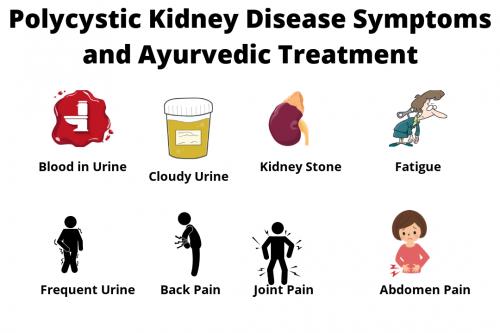Polycystic Kidney Disease Symptoms and Ayurvedic Treatment

Polycystic kidney disease is a genetic disorder related to kidneys. This disease causes many fluid-filled cysts to form in the kidneys. The condition impairs the kidney functionality and it may lead to kidney failure eventually. It is one of major causes of kidney failure. The patients who are suffering from PKD may also have cysts in the liver, pancreas or other body organs. In this post, you will come to know about polycystic kidney disease symptoms and causes. In addition, we will also tell you about polycystic kidney disease treatment in Ayurveda.
Symptoms of Polycystic kidney disease
In most of the cases of PKD, a patient doesn't notice any symptoms of the disease as the formation of the cysts in those patients are slow. The reason is, cyst formation varies from person to person. Primary symptoms that are known to appear in polycystic kidney disease consist:
• Blood in the urine
• Frequent urination
• Changes in the urine output
• Pain in back or sides
• Urinary tract infection (UTI)
• Kidney stones
• Fatigue or weakness
• Pain in joints
• Pain in the abdomen
Causes of Polycystic kidney disease
Polycystic kidney disease is an inherited kidney disorder in which a patient gets the disease as a mutation. In other words, if we say, the patient gets the disease from his/her parents mainly.
What are the types of polycystic kidney disease?
When it comes to the forms of polycystic kidney disease, mainly it has two types. Those types of PKD are listed below:
Autosomal Dominant Polycystic kidney disease (ADPKD) - Autosomal Dominant PKD is the condition in which a person gets this disease from one of his parents who have an abnormal gene of the disease. In a couple when any of the partners is affected with this disease, there is a 50 percent chance that their children can have this disease. It is the most common form of polycystic kidney disease and accounts for almost 90 percent of cases. The symptoms of ADPKD can be noticed between the age of 30 and 40 years.
Autosomal Recessive Polycystic kidney disease (ARPKD) - Autosomal Recessive Polycystic kidney disease is a rare kind of PKD that occurs in a person when both of his parents carry the gene of the disease. Its symptoms generally appear in the initial time of the birth or sometimes even in the womb as well.
How polycystic kidney disease can be detected?
As PKD is an inherited kidney disorder so a doctor will take a look at your family history of kidney disorder. Apart from that, he will ask you to take some lab tests in order to figure out this disease. These lab tests are listed below:
Blood Tests: These tests are very helpful in determining the creatinine level in the blood and glomerular filtration rate.
Urine Tests: The tests will help a doctor in identifying if there is any excess protein leakage or blood excretion through urine.
Imaging tests: Imaging tests like MRI, CT Scan and Ultrasound uses some frequencies, radio frequencies or other that create the internal image of the body. With the help of these tests, a specialist can examine your kidneys' condition as any kind of changes in size, etc.
Kidney biopsy: In this test, a tiny piece of kidney tissue is taken with the help of a surgical needle in order to test under a microscope. This test indicates any kind of damage to the kidney.
Genetic test: Genetic testing is conducted by taking the blood samples of the patient. This test checks the DNA in the blood sample for faults in the PKD genes. It is the most accurate way for the diagnosis of ADPKD.
A doctor may recommend you to take any of the above tests as per your symptoms visibility. Now, the question arises, what if the test shows position indication of polycystic kidney disease? The answer is, find out the best treatment solution that can help you in getting relieved from this genetic disorder completely.
What can be the most promising polycystic kidney diseases treatment?
Since allopathic practitioners prescribe medications for polycystic kidney disease but they only work to eliminate the symptoms. Allopathy has a tendency of curing a disorder by treating its upper symptoms without touching the causes. Apart from that, being made up of some kinds of drugs or chemicals Ayurvedic medications can leave many after use adverse effects on the patients’ body. That’s the reason; you shouldn’t opt for Allopathic treatment when you have a far better option, Ayurveda. Ayurveda is the most ancient and also most effective treatment method that holds the potential of curing all sorts of health disorders permanently with the help of some unrefined natural herbs, balanced diet and correcting the lifestyle of the patients. It works on the root causes of the disease hence the treatment is permanent. Polycystic kidney disease treatment in Ayurveda is the most efficient treatment solution and many PKD patients have got relieved from this condition completely.
What is the role of Karma Ayurveda in Polycystic kidney treatment?
Karma Ayurveda is a leading kidney care center in Delhi offering Ayurvedic treatment for all sorts of kidney disorders. Established in the year 1937, Karma Ayurveda has gained good market reputation by providing the best ayurvedic kidney treatment. With its immense knowledge of Ayurveda, it has cured thousands of kidney patients who are living a healthy life after taking treatment from Karma Ayurveda. When it comes to PKD, Karma Ayurveda provides you with the best-in-class polycystic kidney disease treatment in Ayurveda that has helped numerous patients in attaining wellness and living life free from the complications of polycystic kidney disease.
Contact and come to Karma Ayurveda if you or any of the people in your contact has polycystic kidney disease or any other kidney related health disorder.Post Your Ad Here





Comments